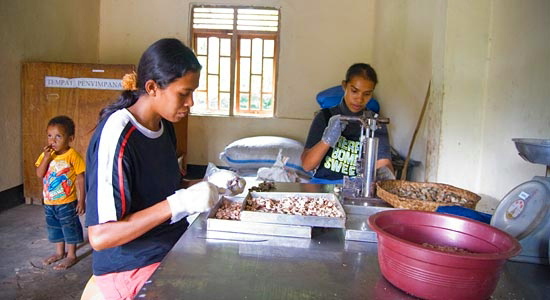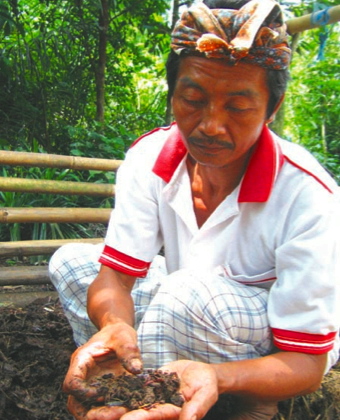Bali-based NGOs are an important part of Indonesia’s growing sustainable agriculture movement
Nicola Edwards
A farmer from Selat in Bali examines the worms that constitute his‘fertiliser factory’VECO-Indonesia |
In Indonesia, most farming is based on the heavy use of artificial pesticides and fertilisers. The switch to these ‘conventional’ farming practices began in the 1970s when the Suharto government encouraged Green Revolution methods. New rice varieties required pesticides and fertilisers to boost production, resulting in Indonesia’s temporary self-sufficiency in rice. But these new farming methods have caused negative environmental impacts, decried by many civil society organisations. Tejo Pramono of the Indonesian Peasants Union and La Via Campesina argues that conventional agriculture kills ‘good’ organisms within the soil and ultimately leads to more severe pest outbreaks, because it damages the natural ecosystem. According to Dr Ni Lu Kartini of the Bali Organic Association, the impacts of conventional agriculture are particularly worrying in Bali, where tourist-fuelled development already strains the natural environment. She explains, ‘Bali’s farming land is already very degraded … and tourism is decreasing as a result of the way we are mistreating our land.’
A plea for environment and culture
In response to the degradation caused by conventional farming, Indonesia now supports a growing trend towards sustainable and organic agricultural practices. In addition to commercial ventures, non-government organisations (NGOs) and farmers’ unions throughout Indonesia promote a return to traditional sustainable methods as well as new, more environmentally friendly farming techniques. Several of these initiatives are clustered in Bali, including the Bali Organic Association, VECO-Indonesia and the Indonesian Development of Education and Permaculture Foundation. While these NGOs are linked to commercial ventures, they are also driven by the desire to promote social and environmental ideals.
Kartini, founder of the Bali Organic Association, one of Indonesia’s oldest sustainable farming groups, argues that adopting organic farming is imperative, not only to save the Balinese environment but also to preserve Bali’s culture. Kartini recalls that when she was young, Balinese farmers were largely self-sufficient, buying only salt, clothing and shrimp paste. But since the 1980s, farming has become increasingly dependent on agrochemical inputs, markets and credit. Kartini laments that not only do farmers spend a large portion of their incomes on chemicals, but these products degrade their soil as well as the greater environment. She insists that the answer to both problems is sustainable farming: ‘I am certain that Bali, with its strong spirit, can be farmed organically. Organics can preserve Bali’s natural environment and culture by ensuring that biodiversity is maintained.’
Kartini is particularly keen on cultivating earthworms, which allow farmers to control their own ‘fertiliser factories’ and free themselves from external inputs. She also describes earthworms as being linked with Balinese Hinduism, recalling with zeal a story about Brahma entering the earth in the form of a worm, thousands of years ago, to purify the soil of poison. According to Kartini, this must be understood as a prediction of the current environmental crisis caused by mainstream agricultural practices.
When the Bali Organic Association was first established as a discussion forum in 1989, staff worked with individual farmers on a grass-roots level, holding workshops to teach them how to make organic fertilisers and pesticides. It also provided worms for farmers to re-introduce in degraded soil. Now the Bali Organic Association is often invited to villages to teach sustainable farming methods. It has worked with the Indonesian branch of the Belgian NGO Vredeseilanden (VECO) to teach its System of Rice Intensification farming to increase productivity of irrigated rice and encourage farming communities to organise local post-harvest processing. The Bali Organic Association has also introduced local quality-control sorting of organic rice, which Kartini says has resulted in more income from rice production remaining in village communities.
More recently the organisation has expanded its activities to include consumer education and distribution of organic products. Since 2007, the Bali Organic Association has focused on increasing consumer awareness about the health benefits of organics, particularly by educating housewives and school children in Denpasar. Kartini asserts that the pesticide residue in conventional produce causes a variety of illnesses, mental disorders and dysfunctional social behaviour, from attention deficit hyperactivity disorder and autism, to incest, infanticide and even the American-led aggression in Iraq. She explains: ‘If the fertiliser we use is contaminated, then everything will become contaminated. Even our way of thinking.’ In 2008 the organisation began testing organic products for sale in Denpasar retail outlets, checking that producers are not falsely labelling goods as organic. Although Indonesia does not yet have an official certification system, the association is investigating ways to legally pursue retailers and producers caught falsely marketing conventional goods as organic.
An international vision
While Kartini and her organisation pursue a distinctly Balinese version of organic agriculture, other NGOs in Indonesia promote a more globalised understanding of sustainable farming and its benefits. VECO-Indonesia’s sustainable agriculture system helps farmers obtain a fair price for their products in a way that is socially and environmentally sound, working on the premise that only small-scale agriculture controlled by family farmers can create food security and improve environmental conditions and farmers’ livelihoods. VECO campaigns for structural change in the ‘agrofood’ production system to give farmers better access to markets and against neoliberal economic policies, arguing that governments must moderate the economy to protect social and environmental interests.
Most of VECO-Indonesia’s activities focus on developing alternative agricultural systems in Eastern Indonesia and Sulawesi through the ‘Low External Input Sustainable Agriculture’ (LEISA) method. While ‘organic’ agriculture normally refers to farming that is entirely free of chemical inputs, LEISA encourages farmers to simply reduce chemical use, where possible substituting locally available natural alternatives. For example, VECO has helped Indonesian farmers develop their own green manure – an alternative to chemical fertiliser – using local fibrous plants including alang-alang grass. While LEISA methods improve farmers’ livelihoods by reducing input costs, LEISA products cannot be marketed as ‘organic’ and sold at a premium price, although many LEISA farmers have converted to entirely organic production and can market their surplus organic rice at a premium price in Jakarta and abroad.
 |
Women in Flores process cashew nuts in an initiative supported by VECO-IndonesiaVECO-Indonesia |
VECO-Indonesia provides funding, facilities and capacity-building support for local partners. For example, since 2002 it has worked with the Sustainable Indonesian Komodo Foundation (Yayasan Komodo Indonesia Lestari) in West Manggarai district, Flores, to teach 3000 farmers LEISA rice-growing techniques. These farmers used to be forced to sell their crops at low prices in advance each year to pay debts, but have overcome this vicious cycle since adopting sustainable methods. In an attempt to increase consumer awareness about organic and sustainable food, VECO holds exhibitions of sustainable farming products in Bali and Java, showcasing quality and availability.
VECO-Indonesia also promotes sustainable agriculture practices and networking through their quarterly magazine, SALAM. While the magazine addresses livelihood concerns and marketing of organic products, it is aimed at farmers, NGOs and consumers who are interested in sustainable agriculture as a system, not simply as a product. VECO distributes up to 2000 copies of each edition, with articles about both Indonesian and international sustainable agriculture initiatives. The ‘Contacts’ section in each issue of the magazine supports networking among sustainable agriculture organisations throughout Indonesia, highlighting groups promoting Indonesian alternative agriculture. According to Country Representative, Rogier Eijkens, VECO aims to ‘work more and more on the networking function of the magazine. And there you have something that might grow into more as a movement.’
Different methods, same movement
The Bali Organic Association and VECO-Indonesia promote different understandings of sustainable agriculture. Kartini supports more strictly defined ‘organic’ practices while VECO-Indonesia argues that even reducing the use of chemical inputs is a good starting point for change. The two organisations are based on different conceptual underpinnings as well. The Bali Organic Association is driven by Kartini’s personal experience of Balinese farming and environmental degradation, while VECO’s initiatives are based on a more general critique of the international agribusiness system.
Though VECO-Indonesia and the Bali Organic Association promote sustainable agriculture through different initiatives, both are parts of a broad Indonesian movement towards sustainable farming. According to VECO staff member IG Suarja, ‘VECO-Indonesia is part of a moral movement. A movement that is concerned with raising the awareness – of farmers, society more broadly and of the government. It is a movement that argues that agricultural management is not just about output but also preserving the land.’ Although the efforts of the Bali Organic Association are more grassroots, Kartini also sees herself as part of an ethically- and spiritually-based movement. These two organisations embody the beginnings of a diverse movement towards sustainable agriculture in Indonesia, a movement that is actively sowing the seeds of a new, greener revolution.
Nicola Edwards (nedw8099@uni.sydney.edu.au) recently completed Honours in Indonesian Studies at the University of Sydney, where her thesis examined the social movement towards sustainable agriculture in Indonesia.
This article is part of the Indonesia's Environmental Challenges mini-series.












